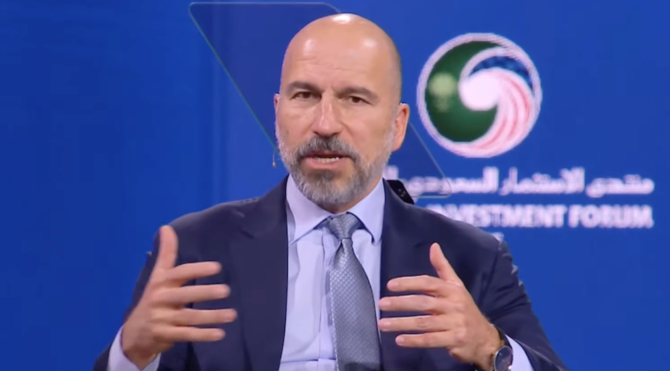RIYADH: The CEO of Uber announced Tuesday that autonomous vehicles will soon be seen in Saudi Arabia.
“You will see autonomous vehicles in Saudi Arabia this year”, CEO Dara Khosrowshahi told a panel at the Saudi-US Investment Forum on Tuesday. “It’s something that we are very focused on.”
He said the vehicles would provide a much safer environment both for the passengers and other road users.
“Autonomous holds incredible potential for us,” he added. “First of all, it represents a safer street, as the autonomous driver isn’t distracted, isn’t going be texting while they’re driving, etc. And it’s a driver that continues to learn from all the experience of all the miles driven all over all over the world.”
“Ultimately, autonomous will not only be safer, but will also be a cheaper form of transportation.”
“We are now working with 18 autonomous partners... to make sure that autonomous technology are introduced in a safe matter.”
He also discussed how the Kingdom represented one of Uber’s top growing markets.
“First of all, the Kingdom represents one of our top growing markets,” he added.
He said there were 140,000 drivers who were now Saudi nationals on the platform, 4 million riders, and he said they operated in 20 cities across the Kingdom.

This session on Saudi Arabia’s GIGA projects offered an in-depth conversation on the next chapter of national transformation. (Screengrab)
On the competition with other transport services he added: “Uber and public transit really do complement each other. There’s a perception that to some extent Uber competes with public transit, but actually our top competitor is personal car ownership and what we see in cities that have a strong public transit infrastructure, we see people using their cars less and Uber becomes a first mile and last mile solution to public transits.”
“So, for example, with the Riyadh Metro system… we offer discounted rides for first mile and last mile ... what we’re trying to then build is a lifestyle that essentially complements public transit.”
This session on Saudi Arabia’s GIGA projects, an in-depth conversation on the next chapter of national transformation, was moderated by Arab News Editor-in-Chief Faisal J. Abbas.
Saudi Arabia has committed itself to an abundance of giga projects as part of Vision 2030 in the Kingdom’s ongoing modernization.
One such project is Diriyah, the birthplace of Saudi Arabia.
Jerry Inzerillo, CEO of Diriyah company, spoke on preserving the Kingdom’s history, and the ancestral home of Al-Saud, the center of cultural heritage and diplomacy,
Celebrating that the project was running to schedule and on budget, he added: “We just welcomed to the UNESCO World Heritage site this week our three millionth visitor. We have 45,000 workers on their job now. We are very honored and pleased to say that right now we’re doing business with 83 American companies.”

Jerry Inzerillo, CEO of Diriyah company, celebrated that the project was running to schedule and on budget. (Screengrab)
Michael Dyke, CEO of the New Murabba Development Project, a vast cube-shaped building in Riyadh forming another part of the Vision 2030 project, said it would be one of the world’s iconic buildings and landmarks.
Dyke said the New Murabba in Riyadh, which is home to the Mukaab structure, would span 2 million square meters of floor space.
“It is one of the greatest, largest structures ever known,” Dyke said.
Drawing a comparison in size to entertainment MSG Sphere in Las Vegas, that seats almost 18,000 people, Dyke said the Mukaab would be 22 times larger.
“So when people enter the Mukaab, they will enter another world, there will be holograms and there will be strong AI driving through the whole of the facility.”
“The Mukaab will come on line in 2030 onwards, when people come to Riyadh they will see something new, something different. It would be another fantastic place that will complement the amazing projects already happening in the Kingdom.”

Michael Dyke, CEO of the New Murabba Development Project (Screengrab)
Another massive project being created as part of the Kingdom’s development is NEOM – a vast city on the Red Sea coast.
Rayan Fayez, Deputy CEO of NEOM, said the 26,500 square kilometer project would be the size of Massachusetts.
“Building a city and a region of this scale, requires significant infrastructure,” Fayez said.
“When we talk about some of the themes that we are spending our time and effort on, infrastructure is a big one. So whether its digital infrastructure, 500 kilometers of fiber has already been laid, a data center being built, power and utility infrastructure already have solar, and wind farms up. In addition to 194 kilometers of water pipeline, food infrastructure, greenhouse is being developed because NEOM is not just a real-estate development initiative, it’s an economy building.”
“It’s an 8.4 billion investment, a joint venture between Neom Aqua Power and Air products, which is, of course, a US company with a significant investment coming into Neom, developing what will become Green Hydrogen Project.”
John Pagano, CEO of Red Sea Global, in terms of investment opportunities he said they have collaborated with a number of American companies and hospitality brands, including Marriot, Hayat and Hilton.




















